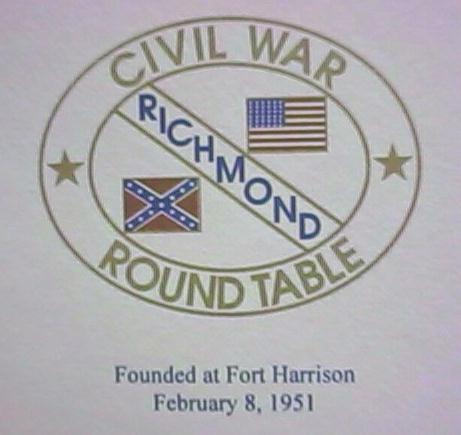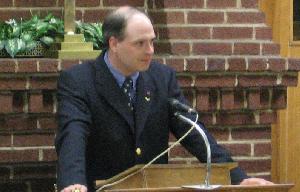


June 2005
rcwrt.org
Richard Forrester, President Rob Monroe, Editor 8008 Spottswood Road 2416 Edenbrook Dr. Richmond, VA 23229 Richmond, VA 23228-3040 dforrester@verizon.net RMonroe500@comcast.net
June 2005 PROGRAM Mr. William W. Bergen "Two Commanders, Two Armies, Two Objectives: The Overland Campaign of 1864" 8:00 p.m., Tuesday, June 10, 2005, at the Boulevard United Methodist Church, 321 N. Boulevard, Richmond, VA (corner of Boulevard and Stuart Ave.) Enter the basement door on the right side under the front steps. William W. "Bill" Bergen has been obsessed with the Civil War for nearly as long as he can remember. He holds the distinction of nearly flunking fourth grade because his teacher said his only talking about the Civil War was a sign of a problem. Notwithstanding that near-setback, he went on to become apparently the only Civil War military historian Vassar College has ever produced. In addition to leading battlefield tours for more than 30 years, Bergen has lectured widely on the Civil War, and is a regular instructor at the University of Virginia's annual Civil War conference where he is the resident expert on the Army of the Potomac. He is the author of "The Other Hero of Cedar Creek: The 'Not Specially Ambitious' Horatio G. Wright," a lengthy biographical essay that will be published later this year by University of North Carolina Press. He is engaged in a long-term study of how politics affected the designation of general officers in the Army of the Potomac. Bergen holds a masters degree in public administration from UVa, and is an assistant dean of the university's law school where he handles a variety of assignments for the Dean, including facilities planning and admissions. He will speak to the Round Table on what Lee and Grant faced before the Overland Campaign.
 |
Pamplin Park Hosts Old Time Fair Pamplin Historical Park and the National Museum of the Civil War Soldier will host its Fifth Annual "Old Time Fair" on Saturday and Sunday, June 25 and 26. The park will combine Civil War era living history with the fun of a mid-1800s county fair. The 19th century entertainment includes music, dancing, food and activities for the entire family at the park near Petersburg in Dinwiddie County.
Special Programs Planned at Gaines Mill and Malvern Hill The Richmond National Battlefield Park will be offering special programs at the sites of two famous clashes of the Seven Days Battles of 1862. On Saturday and Sunday, June 25 and 26, the Gaines Mill anniversary program will include a living history encampment, park ranger guided tours, musket firing demonstrations and historical talks. Events will run from 10am to 5pm Saturday and 10am to 4pm Sunday. On the first two Friday nights in July, the Richmond National Battlefield Park will host special History at Sunset programs, "King of Battle: Artillery at Malvern Hill" on July 1, and "Behind the Lines: Gaines's Mill" on July 8. Both events are free and begin at 7pm on the battlefields. On Saturday and Sunday, July 9 and 10, the Richmond National Battlefield Park will present a Malvern Hill anniversary program. Special activities include Union artillery and Confederate infantry demonstrations, park ranger guided tours, musket firing demonstrations and historical talks throughout the weekend. Events will run from 10am to 5pm Saturday and 10am to 4pm Sunday. An added bonus on Sunday will be a special walking tour exploring the eastern half of the Malvern Hill battlefield on lands recently added to the park.
Lunchtime Lectures Offered in June The Virginia Historical Society and the Library of Virginia will be hosting lectures in June that are of special interest to Civil War enthusiasts. At noon on Thursday, June 16, at the Virginia Historical Society, Donald M. Wilkinson will present a talk on "The Most Good for the Confederacy: Capt. John Wilkinson CSN." Capt. John Wilkinson was the foremost blockade runner of the Civil War but also engaged in commerce raiding, construction of ironclads, covert operations, and purchasing ships and supplies abroad. He was the only naval officer to command every type of vessel operated by the Confederacy. Donald Wilkinson is writing a biography of this prominent naval figure and will speak on his wartime career and on the Confederate government's overall naval strategy. At noon on Thursday, June 30, The Library of Virginia will host Peter S. Carmichael speaking on "The Last Generation: Young Virginians in Peace, War and Reunion." Assistant professor of history at the University of North Carolina at Greensboro, Carmichael will discuss his new book that challenges the popular conception of Southern youth on the eve of the Civil War as intellectually lazy, violent and dissipated. Carmichael examines the lives of more than 100 young white men from Virginia's last generation to grow up with the institution of slavery. He finds them deeply engaged in the political, economic and cultural forces of their time. By examining the lives of members of this generation on personal as well as generational and cultural levels, Carmichael sheds new light on the formation and reformation of Southern identity during the turbulent last half of the nineteenth century. A book signing will follow the free talk.
RCWRT Monthly Speakers for 2005
You can receive your newsletter sooner and help the Richmond Civil War Round Table save money by signing up to receive your newsletter via email. To add your name to the list, simply email the editor at RMonroe500@comcast.net Thanks!
To facilitate the printing and timely distribution of the monthly newsletter, information for it should be submitted to the editor no later than the following dates: July newsletter, July 2 August newsletter, July 30 September newsletter, September 3 October newsletter, October 1 November newsletter, October 29 December newsletter, December 3 Information may be emailed to RMonroe500@comcast.net or Richmond Civil War Round Table Newsletter Rob Monroe, Editor 2416 Edenbrook Dr. Richmond, VA 23228-3040
Return to News Letters Index
Return to main page

©R.C.W.R.T. 2005